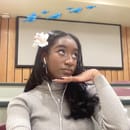Have you ever heard of someone being in their “villain era”? The villains in movies just seem so much more fascinating than the heroes they are opposing. They always seem to have better clothes, they seem so confident, and just overall more interesting. One emerging category in films and media is the female antagonist.
When a hero has almost everything taken from them and is beaten down again and again, they still rise. Villains, on the other hand, get vengeful and become more powerful because of their anger or grief. This makes the antagonist more relatable, because it’s a common reaction to be upset or angry when you’ve been wronged over and over. The typical female antagonist’s story has become more complex and finally been given the depth it deserves.
We’ve seen books and movies and tons of continued series about difficult men, or their gray areas in their ethics or morality. Their backstories that make their murderous and cruel actions have meaning. Then, they are viewed as funny, witty, and entertaining. Why don’t we give the same leeway for women?
When we look at someone like Amy Dunne from “Gone Girl” or Wanda Maximoff from “WandaVision,” they do not get the same praise as someone like Anakin Skywalker and Darth Vader, or John Wick. They are seen as weird or even one-dimensional types of evil — as if being evil is the one thing they’re good at, and it encapsulates their identity. This can be an extremely closed-minded and conservative way of looking at our media. We show the messy and savage parts of being human when it comes to our male villains, and never the other way around.
In the book written by Brett Martin titled “Difficult Men,” he talks about a term called “difficult men” — “monsters we somehow still root for and care about despite their monstrosity.” Difficult men are characters on TV who consistently cross the line and make every excuse we made for them pointless. They go so far off of the deep end that they cannot have a full redemption arc. He wrote this book to speak on famous male antiheroes. He analyzed shows like “Breaking Bad” and “The Sopranos” and found a pattern of traits between people like Walter White and Tony Soprano.
An example of someone challenging this stereotype would be Villanelle from Killing Eve. The show Killing Eve is about a lower-tier government agent (played by Sandra Oh) being brought into an off-the-books investigation on an assassin, Villanelle (played by Jodie Comer). In this show, we do not shy away from who our antagonist is. Even in the first episode, she murders at least six people and three bystanders. This show disrupts the difficult men theory directly, because those men struggle with the weight and aftermath of their decisions, but Villanelle doesn’t. She has a certain flair for her murders. She uses her femininity as an advantage. In one of her kills, she uses a tampon as a reason to her supervisor to go into the bathroom to kill another woman. Or, she hugs her contractor to steal an envelope from his pocket containing her next mission. She doesn’t seem to be concerned with whom she kills — it’s just a job for her, as hideous as it is. She’s comedic, likable, and endearing. Most of all, she’s unpredictable.
We often relate to villains because they usually represent the darker nature of humanity. In media and film, there can sometimes be a double standard based on the sex of the villain because of our representation so far. Audiences might have more sympathy or be more open to male villains because that’s what we are so used to seeing.
When we deviate from that narrative, and argue that women, too, could be just as cold and brutal, there tends to be backlash. It is so important that we give the same complexity to our female antagonists, equality means creating women in film and books who don’t make us look good, who make us look balanced and not so superficial. We need a female antihero who is a skilled chemist, who ends up like Walter White. We need a woman who is as morally corrupt as Tony Soprano.

